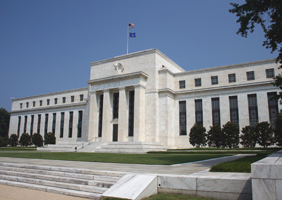Newsroom
Fed's Powell, Quarles: Stress tests need to evolve
 Federal Reserve Chairman Jerome Powell and Vice Chair for Supervision Randal Quarles this week acknowledged the benefits of stress testing following the 2008 financial crisis and offered ways to improve the tests as the financial services landscape changes.
Federal Reserve Chairman Jerome Powell and Vice Chair for Supervision Randal Quarles this week acknowledged the benefits of stress testing following the 2008 financial crisis and offered ways to improve the tests as the financial services landscape changes.
NAFCU has recommended that the NCUA work to increase transparency relative to stress testing procedures and flexibility in its capital planning process to ensure standards are appropriately tailored to fit credit unions' business model, complexity and financial condition.
Powell and Quarles were addressing a research conference on stress testing held Tuesday by the Federal Reserve Bank of Boston.
"Stress testing is perhaps the most successful supervisory innovation of the post-crisis era," said Powell in his welcome remarks. "But if stress tests are to continue to serve their critical function, they will need to evolve in the years ahead to keep pace with the ever-changing financial system, as they have since the first round of tests in 2009."
He said that stress tests of the future should ensure banks' ability to provide necessary credit even during downturns, and prepare banks for unexpected risks. If they don't evolve, "they risk becoming a compliance exercise, breeding complacency from both supervisors and banks," Powell added.
Quarles offered a similar sentiment, saying that stress testing needs to evolve guided by experiences and feedback from stakeholders. He noted that "periodic stress testing has turned out to be a less useful supervisory tool to evaluate the risks of smaller and less complex financial institutions."
"Congress made use of this experience by raising the threshold for stress testing to $100 billion in assets and providing more flexibility for the Fed to tailor stress testing for all firms," he said.
The NCUA last year made some adjustments to its stress testing framework, but credit unions' $15 billion threshold for stress testing is still substantially lower than banks' $100 billion threshold. The Fed also announced this year that banks between $100 billion and $250 billion would only be subjected to stress testing every other year.
Share This
Related Resources
CFPB Orders Bank of America to Pay $12 million
Examination & Enforcement Home-Secured Lending
Blog Post
Equalizing Immigration Status
Consumer Lending Examination & Enforcement BSA
Blog Post
CFPB Issues Advisory Opinion Regarding Requests for Information
Examination & Enforcement
Blog Post
Peering into the Future: 2023 Supervisory Highlights (Pt. 2)
CFPB , Examination & Enforcement
Blog Post
Get daily updates.
Subscribe to NAFCU today.
